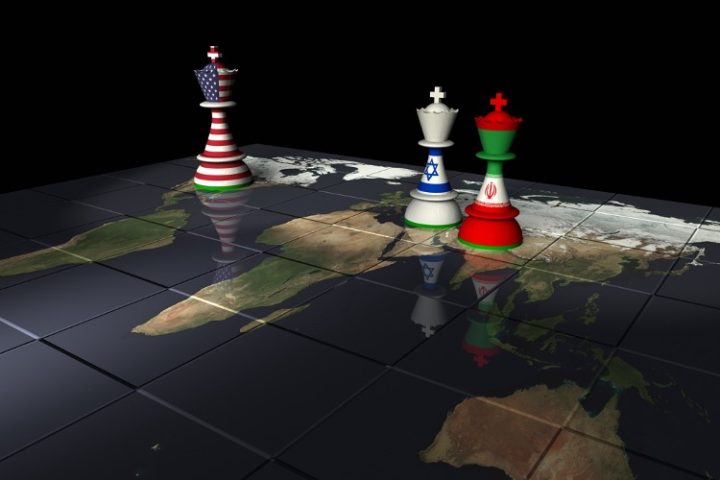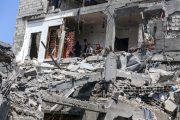
On October 22, Iranian Foreign Minister Hossein Amir-Abdollahian lashed out at the United States for conducting a “proxy war against Palestinians,” cautioning about disastrous ramifications if Israel’s bombing of Gaza does not cease and if the Israel Defense Forces (IDF) conduct a ground invasion of Gaza.
Addressing listeners at a press conference with his South African counterpart Naledi Pandor in Tehran, Amir-Abdollahian said it was a “bitter and unfortunate reality” that President Joe Biden made an “extraordinary wartime visit” to Tel Aviv to display support for Israeli Prime Minister Benjamin Netanyahu’s government amid Israel’s bombing of the Gaza Strip and a paucity of humanitarian aid for Gaza residents.
“It’s a great shame that the American president announced that the US would dispatch hundreds of planes, ships and trucks filled with military equipment to the occupied territories to support the mass murder that Israel is committing in Gaza but has managed to coordinate plans for only 20 trucks carrying humanitarian aid to enter the besieged enclave,” he pointed out.
Amir-Abdollahian characterized the present regional situation as a “powder keg” and warned of “heavy and bitter consequences.”
“If the US and the Israeli regime do not stop their crimes against humanity immediately, there will be a possibility of anything at any moment and the region may spin out of control,” he contended.
Speaking to ABC News on October 22, U.S. Secretary of Defense Lloyd Austin similarly warned about “the prospect of a significant escalation,” pledging to do his best to safeguard U.S. troops based in the region and reinforce Washington’s support for Israel.
Also, Israeli Economy Minister Nir Barkat warned on October 22 that the military was prepared to “eliminate” the Lebanon-based militant group Hezbollah and attack Iran if they create a “northern front” in the current conflict.
“The plan of Iran is to attack Israel on all fronts. If we find they intend to target Israel, we will not just retaliate to those fronts, but we will go to the head of the snake, which is Iran,” Barkat told The Mail, elaborating that “the ayatollahs in Iran are not going to sleep good at night” if they maneuver against Israel.
Barkat stated that Lebanon and Hezbollah, which are supported by Tehran, “are going to pay a heavy price, similar to what Hamas is going to pay,” adding that Israel would go “after the heads of Iran” if necessary.
“Israel has a very clear message to our enemies. We are saying to them, look what’s happening in Gaza — you are going to get the same treatment if you attack us. We are going to wipe you off the face of the Earth.”
The remarks came after Amir-Abdollahian said that Israel’s security situation may deteriorate very rapidly. “If the war crimes against the Palestinians are not immediately stopped, other multiple fronts will open and this is inevitable,” he warned.
The Iranian diplomat subsequently cautioned the United States and Israel that, if they do not cease their actions against Palestinians, “anything is possible at any moment and the region will go out of control,” and declared that further escalation would have “far-reaching repercussions.”
Netanyahu hitherto stated that Hezbollah would suffer “unprecedented destruction” if it officially participates in the war against Israel.
The Israeli army has made various large-scale incursions into Lebanon to combat militants in the past, with its most recent invasion taking place in 2006.
Defense Secretary Austin indicated that American troops stationed in the Middle East are more vulnerable to being attacked, as Iran and its allies reportedly hope to leverage chaos due to the Israel-Hamas war.
Bases hosting U.S. troops in Iraq and Syria have been assaulted by rocket and drone attacks in recent days, and the Pentagon is worried about a worsening of the crisis, Austin said in an ABC News interview.
“In fact, what we’re seeing is the prospect of a significant escalation of attacks on our troops and our people throughout the region, and because of that, we’re going to do what’s necessary to make sure that our troops are in a good position, they’re protected, and that we have the ability to respond.”
Israel began a series of airstrikes on Gaza on October 7, after the Hamas terrorist group staged a brutal and unexpected incursion into its territory, killing 1,400 people, mostly civilians. The IDF and Hezbollah have repeatedly exchanged fire since the eruption of violence between Israel and Hamas. Since the start of the conflict, more than 4,600 Palestinians have been killed, based on figures by Gaza health authorities.
Shortly after Hamas’s attacks on October 7, the Pentagon mobilized two aircraft carriers, five guided-missile destroyers, and other ships to the eastern Mediterranean Sea. One of the strike groups, led by the USS Dwight D. Eisenhower aircraft carrier, was diverted to the Persian Gulf on Saturday, and the Pentagon claimed it activated additional missile batteries in various undisclosed sites to safeguard regional U.S. forces.
“This additional deployment sends another message to those who would seek to widen this conflict,” Austin said. “If any group or any country is looking to widen this conflict and take advantage of this very unfortunate situation that we see, our advice is: don’t. We maintain the right to defend ourselves, and we won’t hesitate to take the appropriate action.”
The destroyer USS Carney, located in the Red Sea, downed three missiles and several drones that were fired from the region of Yemen dominated by Iranian-backed Houthi rebels recently. The missiles were heading north, potentially toward targets in Israel, a Pentagon spokesman claimed.
U.S. Secretary of State Antony Blinken reiterated Austin’s remarks, saying Washington is anticipating more assaults on American troops by Iranian-backed groups.
“We are taking steps to make sure that we can effectively defend our people and respond decisively if we need to,” Blinken declared in an NBC News interview. “This is not what we want, not what we’re looking for. We don’t want escalation. We don’t want to see a second or third front develop. We don’t want to see our forces or our personnel come under fire, but if that happens, we’re ready for it.”
Meanwhile, Russia’s deputy ambassador to the UN, Dmitry Polyansky, said on October 23 that although there can be no excuses for Hamas’ actions on October 7, it is not accurate to call these actions “unprovoked.”
“We unconditionally condemn what was done against Israel on October 7,” Polyansky said at a video conference, based on reports by TASS. “There can be no justification for it.”
However, he pointed out, any UN Security Council denunciation of Hamas has to take into account “the same condemnation of indiscriminate bombing of residential neighborhoods in Gaza and the death of civilians” so that “the signal is not one-sided and unbalanced. We cannot close our eyes to what is happening there, we must be absolutely honest,” Polyansky declared. “Otherwise the UNSC cannot count on having any role in a future settlement.”
According to Polyansky, the recent “explosion” of violence in the Middle East was a result of “many years of lawlessness and the continuation of Israel’s illegal actions against Palestine. Saying that it was unprovoked is completely unjustifiable, and we are not ready to back up this logic, like many of our partners on the international arena.”
Likewise, while Russian President Vladimir Putin has decried the Hamas attack as “unprecedented” in brutality, he has insisted that Israel should not react with cruelty. Instead, Israel should take into consideration the approximately 2,000,000 civilians in the territory.
“Israel has the right to defend itself, but peace can only come along with the establishment of an independent Palestinian state,” Putin maintained. He also criticized America’s “one-sided” approach in contributing to the current conflict by undermining the UN-centered peace process.
The actions of Israeli and Hamas officials, who claim to be protecting their own people on the pretext of violence against the enemy, appear to indicate otherwise.
For example, although a Hamas official told Al-Jazeera TV that the group’s October 7 cross-border assaults in southern Israel were essential to defend “the dignity and freedom” of the Palestinian people, there was evidently a lack of “dignity” or “freedom” when Hamas militants swarmed across the border to kill or take as many civilians hostage as possible. While reports of some of Hamas’ alleged gruesome atrocities have been disputed, what is certain is that Hamas intentionally murdered non-combatants and kidnapped children, women, and civilian men.
Hamas militants were aware that Israel would respond to their attacks at the expense of Palestinian civilians in Gaza City, particularly as the terrorist organization has based its command centers and weapons caches in or under schools, apartment buildings, hospitals, and mosques.
While Netanyahu has promised to “demolish Hamas” and ensure that such attacks against the Israeli people would never happen again, Israel is waging a seemingly losing battle in the court of public opinion when its air strikes kill thousands of Palestinian civilians.
Eventually, ordinary Israeli and Palestinian civilians will be caught in middle, suffering and dying to feed the agendas of their leaders, and survivors will continue to live under the looming shadow of conflict and violence, waiting for the next war.



